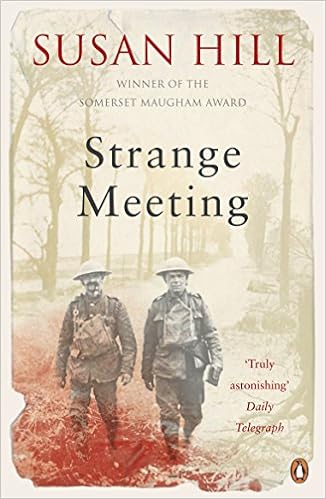Don’t go back to London, to England, don’t go and listen to what they say and read their papers, don’t try and talk to them as you are talking to me, for there is nobody, no one knows. Don’t go. [loc. 635]Strange Meeting is set during the early part of the First World War. John Hilliard returns from medical leave, and the distant and chilly company of his relatives, to his battalion in France. He's shocked to find that many of the men he previously served with have been killed: his commanding officer, Colonel Garrett, is embittered, drinking whisky to insulate himself from the incompetence of his superiors and the despair of his subordinates. Hilliard's natural tendency is to keep to himself, not to get involved with any of it: but he finds himself drawn to new officer David Barton, whose emotional honesty and natural warmth is quite alien to Hilliard. Barton hasn't seen combat, and Hilliard is at once envious and protective of him.
It's hard to describe this novel adequately, or at least I am finding it so: at its core, it's the account of a close and loving friendship and how it transforms -- one might even say rescues -- a man who has frozen himself away to protect himself from a situation, a world, in which he's starved of meaningful human connections.
I don't mean that this is a romance, or a story of a clandestine sexual relationship: while it's certainly possible to imagine those elements, Hilliard and Barton's relationship makes perfect sense without sex or romance. Indeed, these would alter the story, making it a novel about secrecy, or blackmail, or guilt. (Hill says that she didn't intend the relationship to be read as a physical one, too.)
Instead, the friendship between the two men, and their love (a word each uses to the other), is unexceptionable. Their fellow soldiers accept that Hilliard cares about Barton, and vice versa: there is no indication of any sordid rumours. Barton's family -- to whom he writes long, emotional letters -- semi-adopt Hilliard, and begin writing to him as well as to Barton: their letters are an antidote to the hasty, dismissive notes he gets from his sister and his mother. Barton teaches Hilliard to connect with others: Hilliard, perhaps, teaches Barton to deal with his first brushes with carnage.
It's a beautiful account of the blossoming of a friendship, one which could perhaps only happen in a battlefield setting when all normality is stripped away. Hill's depiction of trench warfare, of battle, are neither heavy-handedly grim nor cheerily patriotic: she is more concerned with how the war affects those who fight.

No comments:
Post a Comment